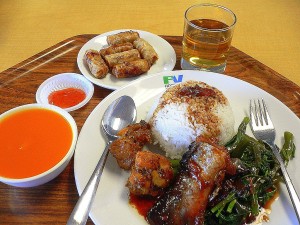According to Thanhnien News, 33 outbreaks resulting in over 2000 cases of foodborne illness have been linked to cheap, work-provided lunches in Vietnam this year, including one a couple of weeks ago. National health officials blame poor local oversight over kitchens.
Nice support from folks that are supposed to work together.
Lunch for workers at a shoe factory in Binh Duong Province is mostly rice and a little pork and vegetables.
The mass food poisoning suffered by 441 workers at the factory on October 21 was a reminder of the unhealthy factory lunches provided in Vietnam, which has been a major cause of wildcat strikes and the fact that its productivity is among the lowest in the world.
Truong Thi Bich Hanh, vice chairwoman of the Labor Union in Binh Duong, an industrial hub with 150,000 companies, said at least 8 percent of them pay only around 40 cents for a worker’s meal, or less than half the price of a cheap meal at a street eatery.
At least 33 cases of mass food poisoning involving 2,302 people, most of them factory workers, have been reported across the country this year.
Nguyen Thanh Phong, head of the food safety department at the health ministry, said the cost of the meal is too low to ensure quality.
“Low-quality ingredients easily suffer bacterial or toxic contamination,” Phong said, adding that some kitchens even use ingredients that are already spoiled.
He also blamed local authorities for failing to monitor hygiene in factory kitchens, many of which are open for a long time before receiving any food safety and hygiene checks.
